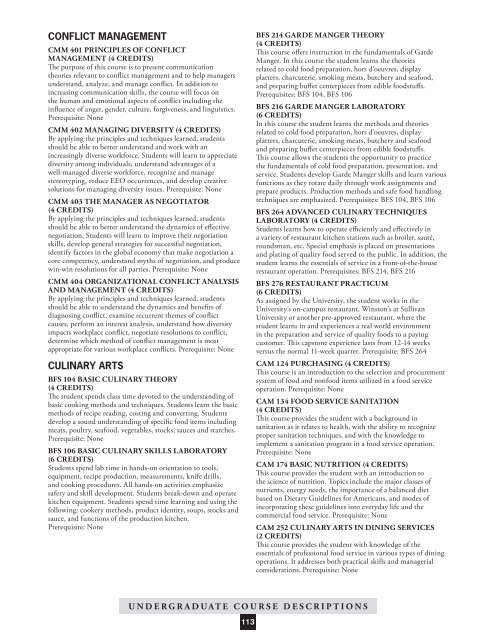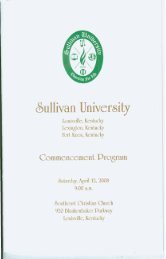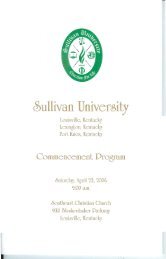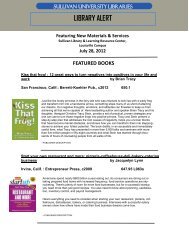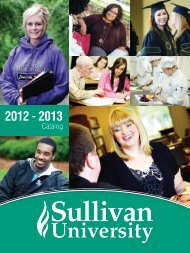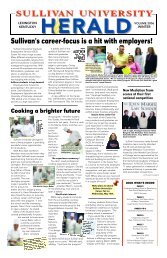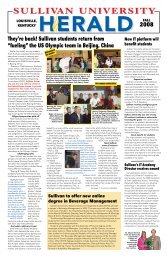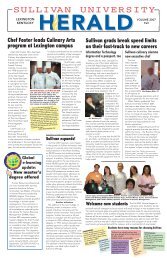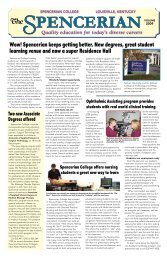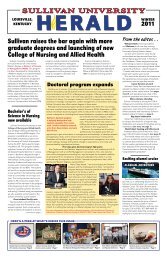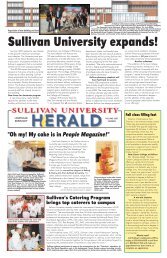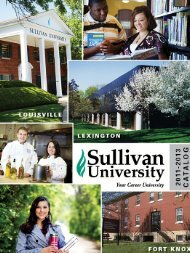Undergraduate Course Descriptions - Sullivan University | Library
Undergraduate Course Descriptions - Sullivan University | Library
Undergraduate Course Descriptions - Sullivan University | Library
Create successful ePaper yourself
Turn your PDF publications into a flip-book with our unique Google optimized e-Paper software.
CONFLICT MANAGEMENT<br />
CMM 401 PRINCIPLES OF CONFLICT<br />
MANAGEMENT (4 CREDITS)<br />
The purpose of this course is to present communication<br />
theories relevant to conflict management and to help managers<br />
understand, analyze, and manage conflict. In addition to<br />
increasing communication skills, the course will focus on<br />
the human and emotional aspects of conflict including the<br />
influence of anger, gender, culture, forgiveness, and linguistics.<br />
Prerequisite: None<br />
CMM 402 MANAGING DIVERSITY (4 CREDITS)<br />
By applying the principles and techniques learned, students<br />
should be able to better understand and work with an<br />
increasingly diverse workforce. Students will learn to appreciate<br />
diversity among individuals, understand advantages of a<br />
well-managed diverse workforce, recognize and manage<br />
stereotyping, reduce EEO occurrences, and develop creative<br />
solutions for managing diversity issues. Prerequisite: None<br />
CMM 403 THE MANAGER AS NEGOTIATOR<br />
(4 CREDITS)<br />
By applying the principles and techniques learned, students<br />
should be able to better understand the dynamics of effective<br />
negotiation. Students will learn to improve their negotiation<br />
skills, develop general strategies for successful negotiation,<br />
identify factors in the global economy that make negotiation a<br />
core competency, understand myths of negotiation, and produce<br />
win-win resolutions for all parties. Prerequisite: None<br />
CMM 404 ORGANIZATIONAL CONFLICT ANALYSIS<br />
AND MANAGEMENT (4 CREDITS)<br />
By applying the principles and techniques learned, students<br />
should be able to understand the dynamics and benefits of<br />
diagnosing conflict, examine recurrent themes of conflict<br />
causes, perform an interest analysis, understand how diversity<br />
impacts workplace conflict, negotiate resolutions to conflict,<br />
determine which method of conflict management is most<br />
appropriate for various workplace conflicts. Prerequisite: None<br />
CULINARY ARTS<br />
BFS 104 BASIC CULINARY THEORY<br />
(4 CREDITS)<br />
The student spends class time devoted to the understanding of<br />
basic cooking methods and techniques. Students learn the basic<br />
methods of recipe reading, costing and converting. Students<br />
develop a sound understanding of specific food items including<br />
meats, poultry, seafood, vegetables, stocks, sauces and starches.<br />
Prerequisite: None<br />
BFS 106 BASIC CULINARY SKILLS LABORATORY<br />
(6 CREDITS)<br />
Students spend lab time in hands-on orientation to tools,<br />
equipment, recipe production, measurements, knife drills,<br />
and cooking procedures. All hands-on activities emphasize<br />
safety and skill development. Students break-down and operate<br />
kitchen equipment. Students spend time learning and using the<br />
following: cookery methods, product identity, soups, stocks and<br />
sauce, and functions of the production kitchen.<br />
Prerequisite: None<br />
113<br />
BFS 214 GARDE MANGER THEORY<br />
(4 CREDITS)<br />
This course offers instruction in the fundamentals of Garde<br />
Manger. In this course the student learns the theories<br />
related to cold food preparation, hors d’oeuvres, display<br />
platters, charcuterie, smoking meats, butchery and seafood,<br />
and preparing buffet centerpieces from edible foodstuffs.<br />
Prerequisites: BFS 104, BFS 106<br />
BFS 216 GARDE MANGER LABORATORY<br />
(6 CREDITS)<br />
In this course the student learns the methods and theories<br />
related to cold food preparation, hors d’oeuvres, display<br />
platters, charcuterie, smoking meats, butchery and seafood<br />
and preparing buffet centerpieces from edible foodstuffs.<br />
This course allows the students the opportunity to practice<br />
the fundamentals of cold food preparation, presentation, and<br />
service. Students develop Garde Manger skills and learn various<br />
functions as they rotate daily through work assignments and<br />
prepare products. Production methods and safe food handling<br />
techniques are emphasized. Prerequisites: BFS 104, BFS 106<br />
BFS 264 ADVANCED CULINARY TECHNIQUES<br />
LABORATORY (4 CREDITS)<br />
Students learns how to operate efficiently and effectively in<br />
a variety of restaurant kitchen stations such as broiler, sauté,<br />
roundsman, etc. Special emphasis is placed on presentations<br />
and plating of quality food served to the public. In addition, the<br />
student learns the essentials of service in a front-of-the-house<br />
restaurant operation. Prerequisites: BFS 214, BFS 216<br />
BFS 276 RESTAURANT PRACTICUM<br />
(6 CREDITS)<br />
As assigned by the <strong>University</strong>, the student works in the<br />
<strong>University</strong>’s on-campus restaurant, Winston’s at <strong>Sullivan</strong><br />
<strong>University</strong> or another pre-approved restaurant, where the<br />
student learns in and experiences a real world environment<br />
in the preparation and service of quality foods to a paying<br />
customer. This capstone experience lasts from 12-14 weeks<br />
versus the normal 11-week quarter. Prerequisite: BFS 264<br />
CAM 124 PURCHASING (4 CREDITS)<br />
This course is an introduction to the selection and procurement<br />
system of food and nonfood items utilized in a food service<br />
operation. Prerequisite: None<br />
CAM 134 FOOD SERVICE SANITATION<br />
(4 CREDITS)<br />
This course provides the student with a background in<br />
sanitation as it relates to health, with the ability to recognize<br />
proper sanitation techniques, and with the knowledge to<br />
implement a sanitation program in a food service operation.<br />
Prerequisite: None<br />
CAM 174 BASIC NUTRITION (4 CREDITS)<br />
This course provides the student with an introduction to<br />
the science of nutrition. Topics include the major classes of<br />
nutrients, energy needs, the importance of a balanced diet<br />
based on Dietary Guidelines for Americans, and modes of<br />
incorporating these guidelines into everyday life and the<br />
commercial food service. Prerequisite: None<br />
CAM 252 CULINARY ARTS IN DINING SERVICES<br />
(2 CREDITS)<br />
This course provides the student with knowledge of the<br />
essentials of professional food service in various types of dining<br />
operations. It addresses both practical skills and managerial<br />
considerations. Prerequisite: None<br />
UNDERGRADUATE COURSE DESCRIPTIONS


